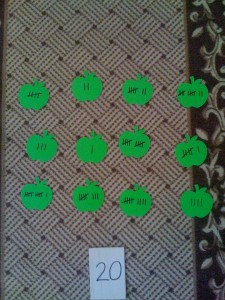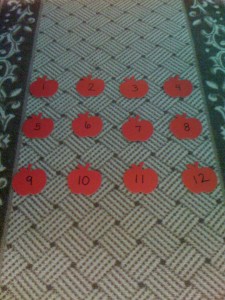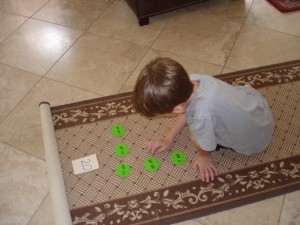This is one of my favorite My Obstacle Course station activities because it is so simple and has so many possibilities!

Crawl and Match is as simple as it sounds. On one end of a carpet runner, or carpeted area, I place some objects, cards or cutouts which focus on some academic skill. He chooses one, crawls down the carpet and matches it with something on the other end. He crawls back gets the next one and continues doing this until all objects or cards have been matched. Because he is matching, he doesn’t need to have intelligible language to demonstrate what he knows.


Crawl and Matches we’ve done (or some ideas for you to try):
- matching items of same color, shape or purpose
- matching words and pictures
- matching up numbers for number recognition
- tally marks matched with numbers
- math facts matched with sums or differences
- letters matched for letter recognition
- uppercase letter matched with lowercase letter
- matching two words to form compound words
- matching words with definitions
- matching holidays with descriptions
- matching historical figures with descriptions
*This list is by no means all of the possible ways one can Crawl and Match. Think about what your child is working on in school or a skill you want to help them build and see if you can turn it into a Crawl and Match station activity!

Alternatives:
I have altered this activity at times depending on how he is doing. I think about what he needs that particular day and since there is such little set up required, it is easy to make these adjustments. Here are some alternatives I have tried:
- I will provide items or cards for him to sort instead of matching things up.
- He can somersault, hot-dog roll, bear walk, crab walk, slither, run or skip down the runner.
- If he needs more sensory input, I’ll use a fabric tunnel for him to crawl though.
- On days where his engine is running high, I’ll incorporate the stairs for Climb and Match instead. This is more work for him and also helps with coordination when done walking up one foot on each step.
Why Crawl At All?
Years ago, during a course for teachers in my county, I first learned about how cross patterning and crossing the mid-line of one’s body can help students make connections to help them remember things. I heard this again at a brain conference years later, where they emphasized the importance of creeping, crawling, running, swimming, monkey bars – basically any type of activity that utilized both sides of the brain at the same time. I also found it fascinating that the distance from our eyes to the ground when crawling is about the same distance from our eyes to materials we read. I figured that increasing physical activity is never a bad thing and I was hopeful about this considering Andrew’s limitless energy. However, when I returned home and was trying to encourage him to crawl around the house with me, he was not having any of it. I realized that if I wanted him to do this, I needed to do something to make crawling purposeful and came up with this activity.
Engage, Encourage and Empower!